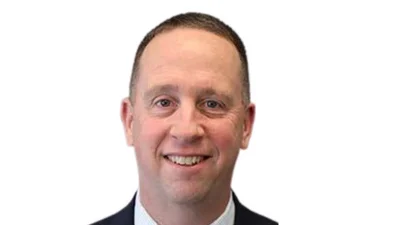State Sen. Craig Wilcox, a retired Air Force colonel.
State Sen. Craig Wilcox, a retired Air Force colonel.
The Gov. Pritzker tax hike.
That’s the phrase state Sen. Craig Wilcox (R-McHenry) uses when referring to what he predicts will be a jump in property taxes for homeowners in 2021. He discussed the tax, without that evocative label, in a June 26 Wirepoints article written by Ted Dabrowski and John Klingner.
Wilcox didn’t have to read the article to grasp the theory, as it was his idea to begin with, he said.
“I gave Ted Dabrowski and John Klingner a call to tell them about it,” he told Lake County Gazette. “I brought this to their attention. I said, ‘Guys, we’re going to have a Gov. J.B. Pritzker tax hike and no one is writing about it.’”
The article does quote Wilcox, in his first term representing the 32nd District.
“We’ve seen very few public sector unions kicking in on this ‘Illinois is all in this together.’ There’s not been a halt to automatic COLAs,” he was quoted as saying. “And there’s not been agreement by the public unions to renegotiate any collective bargaining agreements on a short-term scale. We’ve not seen significant layoffs. I don’t think we’re going to see lower tax levies come November-December of this year.”
Wilcox said he saw all this coming once Pritzker used emergency orders during the COVID-19 pandemic. That allows commercial and industrial taxpayers to appeal their tax assessments, he told Lake County Gazette.
“It’s basically a smart business decision so they have every right to file an appeal of an asset,” Wilcox said.
He said some landlords may offer a rebate to their tenants if they sign an affidavit that they were forced to vacate their property due to the pandemic. Wilcox also said he hopes county auditors ensure that some landlords don’t try to double-dip by collecting rent and seeking a reduction in assessment, adding, "That’s one I hope assessors look for.”
With commercial and industrial taxpayers seeking and likely receiving lower assessments, local governments will look to homeowners to fill their coffers, which is why they should see higher taxes next year, Wilcox predicts.
He said it was apparent months ago when the governor began using his emergency powers, but he doubts Pritzker realized the consequences.
“I’m sure this is so deep in the weeds that none of his advisors explained it to him,” he said.
Wilcox said the treat of a tax increase needs to explained to people as once property tax bills are sent out next year, people will howl for their assessor’s head.
“And that’s the problem in Illinois,” he said. “We enact a bill and smart lawyers and smart business people, they find a problem with it and they exploit it.”
The main issue is the way Illinois funds education, Wilcox said. The state does not supply the needed money, passing the burden on to local governments who rely on heavy property taxes.
“They’re driven by a failure of the state to properly fund a program it’s supposed to be funding,” he said.
Kilngner examined the problem in a piece he wrote for Illinois Policy.
“Nowhere is this more evident than in the state’s General State Aid, or GSA, for education budget — Illinois’ largest single education appropriation for K-12 education," he wrote. "Originally intended to support the state’s neediest school districts, the $4.8 billion GSA has become, in a single decade, a twisted mess of formulas that provide large, special subsidies to a few select districts.
“As recently as 2000, the vast majority of the GSA was distributed to school districts that demonstrated need. Nearly 90 percent of aid went to districts that lacked the local funds to meet the state’s minimum funding standards. But because of changes to the GSA formulas, billions in special subsidies now flow to Chicago and districts in Cook County and its collar counties.”
As the Wirepoints piece points out, putting an unfair burden on homeowners has been an ongoing problem that continues to get worse.
“A shift in the state’s tax burden toward households has been going on for decades,” it states. “Residential property owners paid about half of the $11.7 billion in total property taxes 25 years ago. Today they shoulder nearly two-thirds of the $31.8 billion property tax burden.”
Wilcox has the advantage of seeing Illinois with fresh eyes.
He moved to Illinois in 2013 after retiring as a colonel from the U.S. Air Force, following 24 years of service, earning a pair of Bronze Star medals during combat tours in Iraq. Wilcox was the commander of the 89th Airlift Support Group at Joint Base Andrews, Maryland, when he retired.
He was born in El Paso, Texas, raised in Essex Junction, Vermont, and settled in McHenry with his wife Janice when he took off the uniform. He represented District 4 on the McHenry County Board from 2014-18 before being elected to the Illinois Legislature.





 Alerts Sign-up
Alerts Sign-up